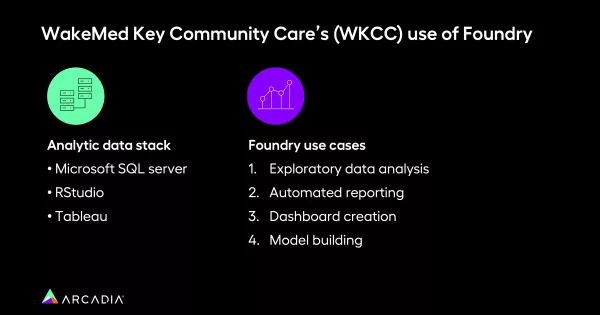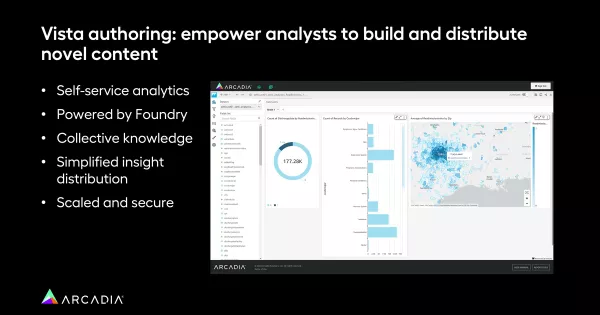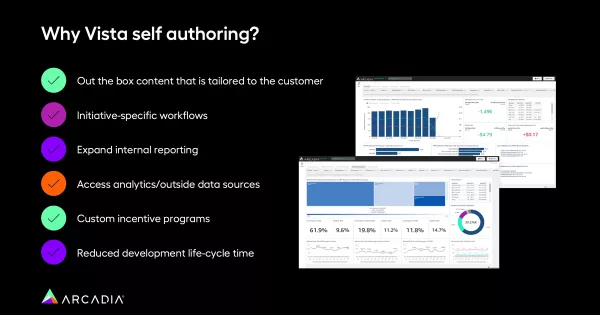How to create a trusted and consistent data foundation for healthcare
Unlock the potential of Foundry and Vista Self-Authoring for healthcare analytics
Healthcare leaders are constantly seeking ways to harness the power of data analytics to improve patient care, enhance operational efficiency, and drive better outcomes. In this article, we will delve into how healthcare organizations can effectively utilize Foundry, a data query tool for technical healthcare professionals on the Arcadia Data Platform, to gain valuable network insights.
This topic was addressed by Jake Tinkham, Senior Director of Account Operations at Arcadia, Connor Navrude, Senior Account Executive at Arcadia, and Jon O’Neil, Director of Analytics and IS at WakeMed Key Community Care (WKCC).
Before we dive into the specifics of Foundry, it's essential to understand that Arcadia is a data and analytics company. Arcadia transforms data into powerful insights that benefits providers, health systems, payers, and more. Foundry is one of the tools Arcadia offers to achieve this goal.
How to leverage Arcadia Foundry for data analysis
What is Foundry?
Foundry is a robust analytics platform that empowers healthcare organizations to harness the full potential of their data. Many healthcare organizations have successfully leveraged Foundry to extract, manipulate, and visualize data to meet their reporting needs and address the unique challenges within their networks.
Jon O'Neil, Director of Analytics and IS at WakeMed Key Community Clinics, shared insights into how his organization has utilized Foundry. WKCC created an analytic stack that incorporates Foundry alongside other programs like Microsoft SQL Server, RStudio, and Tableau. These tools provide unique ways to connect to data and streamline reporting processes.

With these tools, WKCC conducts exploratory data analysis, population segmentation, cluster analysis, and automated reporting. By automating reporting, they ensure that stakeholders always have access to up-to-date information, surpassing the capabilities of out-of-the-box solutions.
Dashboards are also an integral part of their reporting strategy, providing board members with an overview of network health. Furthermore, WKCC is venturing into model building to gain deeper insights into cost dynamics and population dynamics, helping them serve their patients more effectively.
Introducing Vista Self-Authoring

A important feature powered by Foundry is called Vista Self-Authoring. This feature empowers healthcare organizations to create custom dashboards and reports without relying heavily on external assistance. It allows organizations to keep their clinical data and reporting centralized within the Arcadia platform, all powered by Foundry.
Vista Self-Authoring provides the flexibility to load external data from various sources into the Arcadia sandbox data environment. Jon's team at WKCC has already begun taking advantage of this capability, merging external data with Arcadia's standard datasets to meet their specific needs. This collaborative approach fosters collective knowledge-sharing among partners.
Advantages of self-authoring dashboards

Self-authoring within Foundry offers several advantages that make it important for healthcare organizations:
- Customization: Out-of-the-box content provided by Arcadia can be tailored and tweaked to meet the specific needs of each organization. Healthcare leaders can start from scratch, building their visualizations and reports as desired.
- Centralized data: Self-authoring allows organizations to expand their internal reporting capabilities while keeping data centralized within the Arcadia platform. This eliminates the need to export data to build custom dashboards elsewhere, streamlining the reporting process.
- Incorporating external data: Healthcare organizations can bring in external data sources and merge them with existing datasets in Arcadia. This provides a comprehensive view of network insights and facilitates data-driven decision-making.
- Tailored approach: Self-authoring caters to the unique needs of each healthcare organization. It enables the creation of custom incentive programs, specialized dashboards, and tailored reports that align with specific initiatives.
- Reduced development time: By reducing the need for extensive coding and quality assurance, self-authoring accelerates the development life cycle. This results in faster deployment of reporting solutions, empowering organizations to respond rapidly to changing healthcare dynamics.
The transition from legacy systems
It's natural for healthcare organizations to wonder if Foundry and Vista Self-Authoring are meant to replace existing tools like Tableau. Jake Tinkham clarified that Foundry and self-authoring are not replacements, but valuable additions to an organization's analytics arsenal.
The transition can involve replacing certain reports that can be recreated more efficiently within Foundry. Still, it often complements existing systems, especially when dealing with complex, long-standing solutions.
Jon O'Neil shared that, in the case of WKCC, Foundry would initially supplement their existing reporting tools. Over time, as they explore the full capabilities of self-authoring and Foundry, it may lead to the retirement of certain Tableau reports. The key takeaway is that Foundry and self-authoring enhance an organization's analytics capabilities and can seamlessly coexist with existing systems.
Real-world applications
To illustrate the practical applications of Foundry and Vista Self-Authoring, Jon O'Neil discussed two key initiatives at WKCC. The first involves providing board members with informative dashboards for monthly board meetings. Instead of reverse-engineering existing dashboards, self-authoring allows them to create and present these dashboards more efficiently.
The second initiative focuses on empowering the care management team at WKCC. This team often requires new visualizations and reporting to support their evolving initiatives. Self-authoring gives them the autonomy to work closely with analysts and create dashboards tailored to their specific needs. This approach saves valuable time and accelerates their ability to respond to changing circumstances.
Embracing a data-driven future
Foundry and Vista Self-Authoring are powerful tools in the healthcare analytics landscape. They enable healthcare leaders to harness the full potential of their data, streamline reporting, and make data-driven decisions that benefit both patients and organizations.
While these tools can complement existing systems, they offer unique advantages, such as customization, centralized data, and reduced development time.
As the healthcare industry continues to evolve, healthcare organizations must stay agile and responsive. Foundry and self-authoring empower them to do just that by putting the power of data analytics directly into their hands. With the ability to create custom reports and dashboards, healthcare leaders can gain deeper network insights, drive meaningful change, and ultimately improve patient care.
We’d love to discuss how to put your data to work. Reach out directly to our sales team or watch more of our Byte-Sized Insights.
